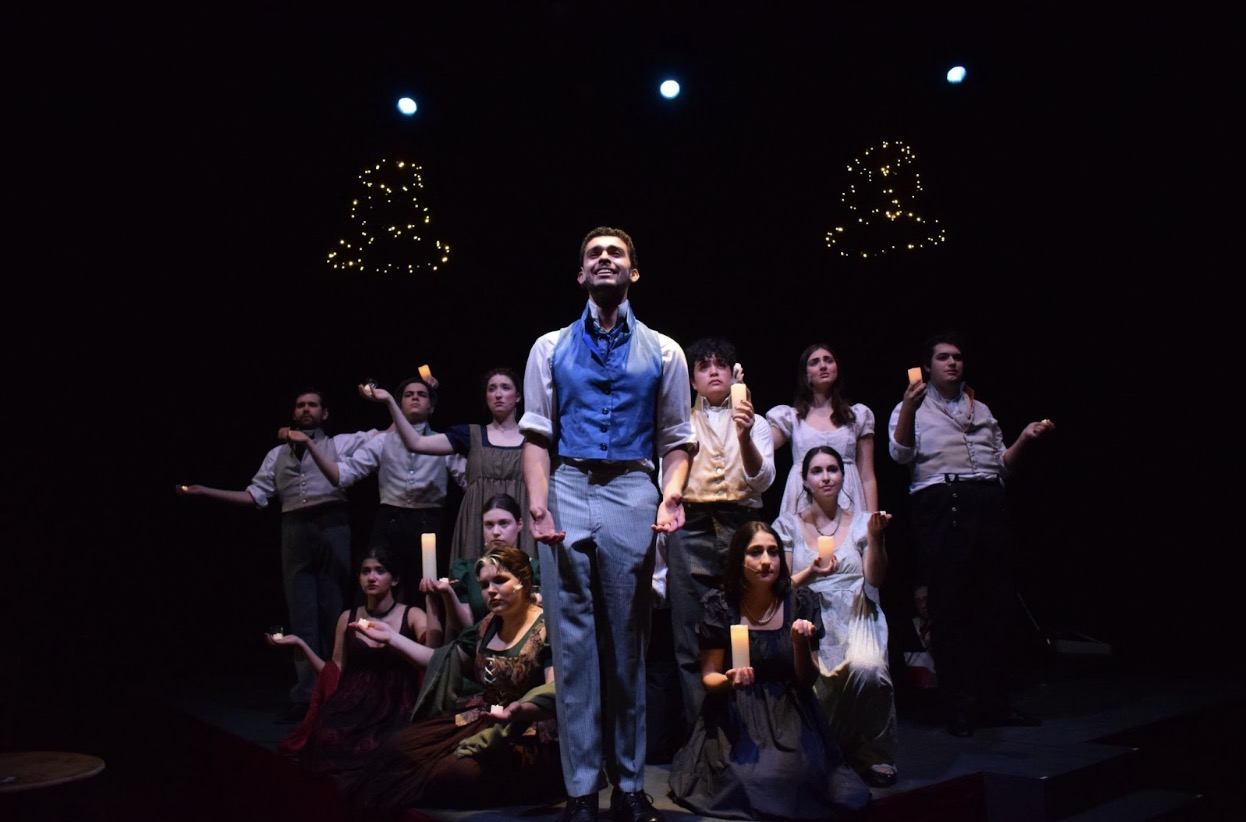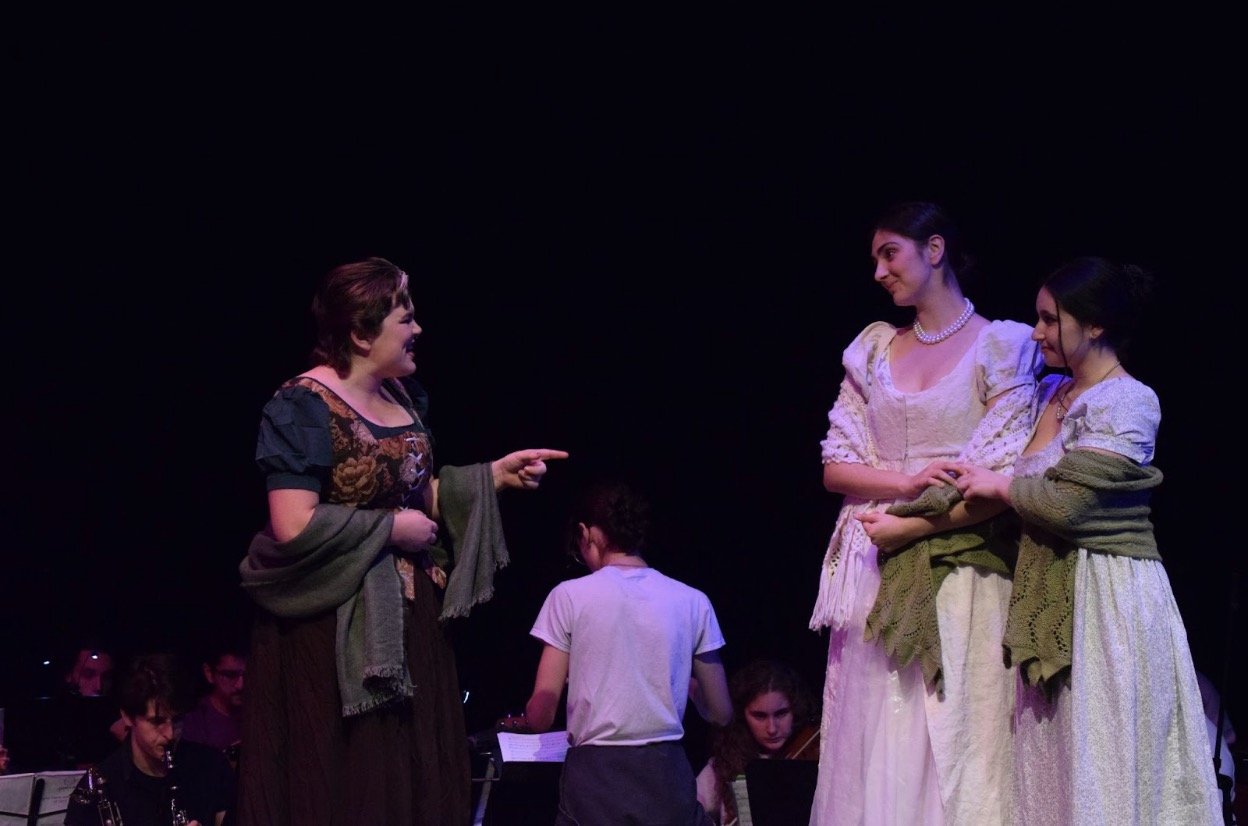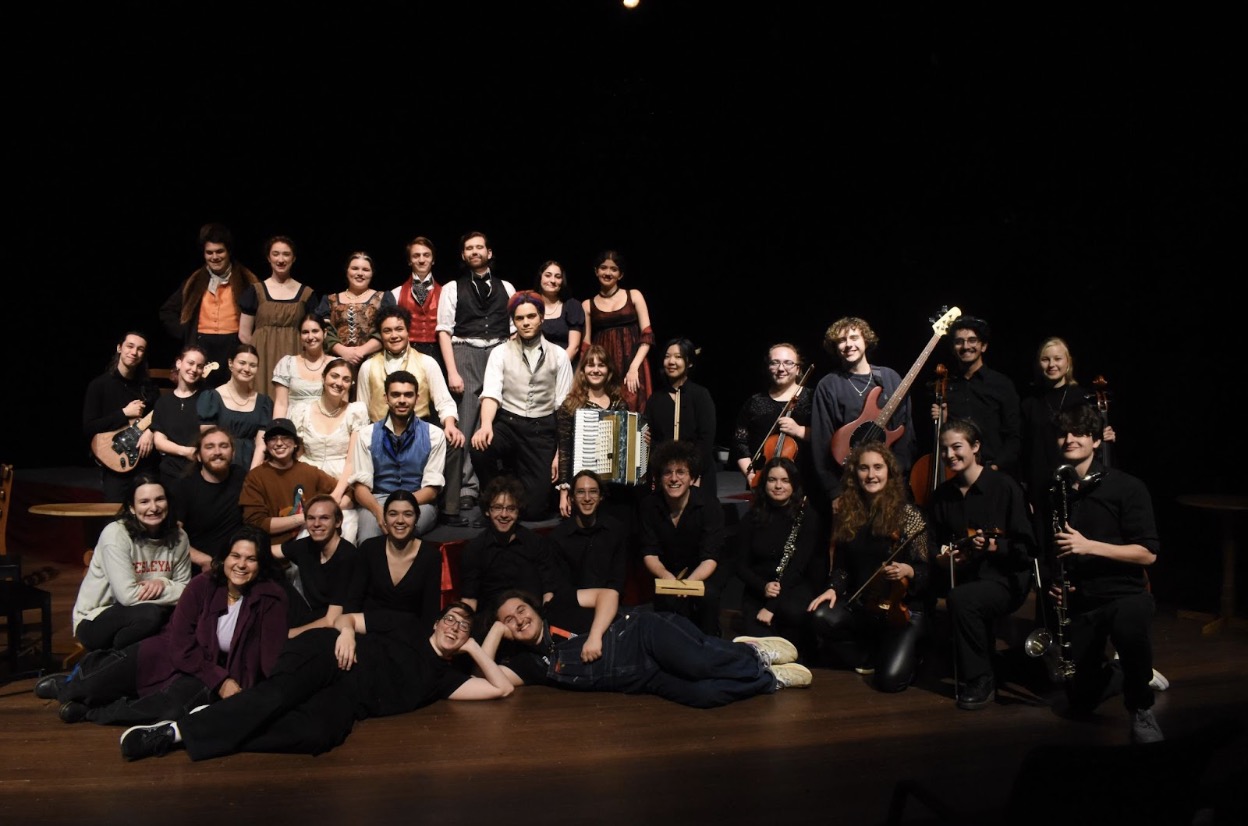
Between the stellar cast, the 14-person orchestra pit, and the technical brilliance, “Natasha, Pierre & the Great Comet of 1812” was a standout show this semester. Written by Dave Malloy and directed by Kendall McDermott ’25, the show was an ambitious undertaking for Spike Tape, as the story unfolds over the course of two straight hours of operatic singing. Yet from the audience’s perspective, it seemed effortless. The show was performed in the Patricelli ’92 Theater on Friday, Nov. 17 at 8:00 p.m. and Saturday, Nov. 18 at 1:00 p.m. and 7:00 p.m.
The show is a musical adaptation of a 70-page selection of Leo Tolstoy’s “War and Peace” and follows the countess Natasha (Sage Saling ’26) as she falls in love with Anatole (Ale Philippides ’27) while her fiancé Prince Andrey (Drew Weddig ’24) is off at war.
“It was really fun to play her,” Saling said. “There’s such extreme moments because she’s so young and so naive, so that was really fun to get to explore and experiment [with]. I also think she goes on such a journey. Where she starts to where she ends [are] quite different spectrums. I also think she grows a lot in her understanding of just the world and cruelty within it and what love is.”
The show opens with the “Prologue,” a full-ensemble number that introduces all of the principle characters in one-word descriptions and sets up the complicated world the audience has entered. This is especially important since the musical’s story begins with Book II of the novel. The singing and choreography made the song into a spectacle and perfectly set up the rest of the show. And despite the disclaimer in the song that the plot would be hard to follow, I thought the actors did a phenomenal job making each event clear as the musical progressed.

Both Natasha and Pierre (Cory Garcia ’25), the other titular character, are characters who don’t have everything figured out. While Natasha is romantically torn between Anatole and Andrey, Pierre is unhappy in his marriage and desires change.
“Natasha’s story to me is about being young and making mistakes and a sense of, once you do make a mistake, how does that maybe change the direction of your life,” McDermott explained. “And for Pierre, it’s someone who’s older and saying, ‘Maybe I don’t have a sense of purpose in life.’”
With encouragement from Anatole’s sister Hélène (Chloé Naudet ’27) in the song “Charming,” Natasha chooses her lust for Anatole over her engagement to Andrey, without knowing that Anatole is already married. With this decision, she ruins her relationship with the prince and her reputation in the high society world of Moscow. By the end of the play, Natasha has matured and realized her mistakes—irreversible though they may be—and Pierre finally has a moment of hope as he sees the Great Comet of 1812 cross the sky. He tells Natasha in the second-to-last song, “Pierre & Natasha,” that if he were a better (and unmarried) man, he would marry her. Both actors delivered an extremely emotional performance and you could really feel Pierre’s sincerity through Garcia’s incredible acting. If you plan on reading “War and Peace” for the first time, close your eyes for this next part of the sentence: At the end of the novel, the two do get married.
The vocals were absolutely mind blowing across the board. I was particularly impressed by Saling and Molly Volker ’26 as Mary in “Natasha & Bolkonskys” singing in deliberate and captivating dissonance with each other. Claire Edwards ’24 was also a standout as Marya, Natasha’s godmother. They emphasized their songs with a distinctive growl that wonderfully echoed Grace McLean’s performance in the Broadway version of the show. The growling effect distinguished Marya as a character and made her numbers pop. The lighting, designed by Alex White ’26, and the costumes, mostly handmade by Greta Armbrust ’25, were also extremely impressive.

For McDermott, Natasha and Pierre’s emotional journeys hold particular resonance for an audience of mainly college students. While the details of the characters’ lives may not be relatable for most audiences, their struggles definitely are.
“The investigation of those two perspectives is really valuable on a college campus where people are in a particular time of tumult,” McDermott said.
With such a big cast, crew, and pit, the show was certainly one of the biggest shows Spike Tape has put on in its four semesters as a student group on campus. Despite the scale, McDermott said that the process went smoothly.
“It was a really good group of people and they really put in so much effort outside that makes all the difference,” McDermott said. “So really it was kind of the ideal group.”
Saling echoed this sentiment.
“Everyone in the show was so amazing and just the best people to work with; just so kind and so gracious,” Saling said. “And because I think this was such a big show, we all had to trust and bond with each other in order to do it.”
From open to close, the show was a delight thanks to the contributions of the wonderful cast, crew, and band.
Ali Eckstein can be reached at aeckstein@wesleyan.edu.


Leave a Reply